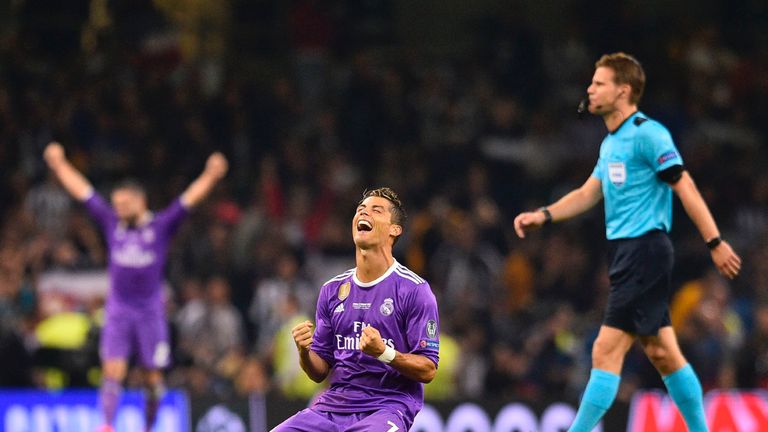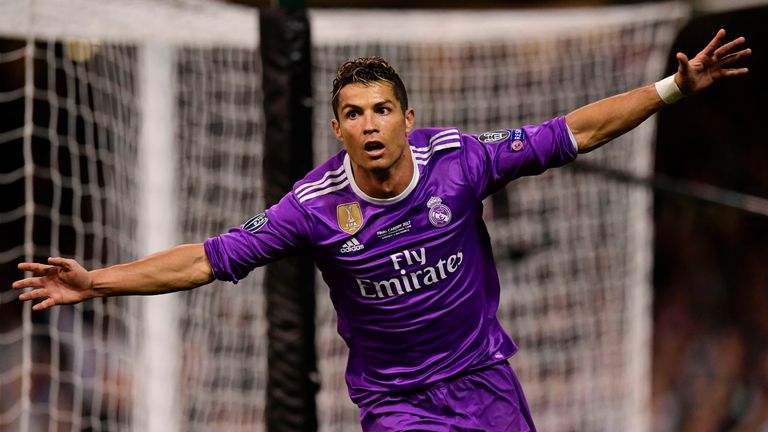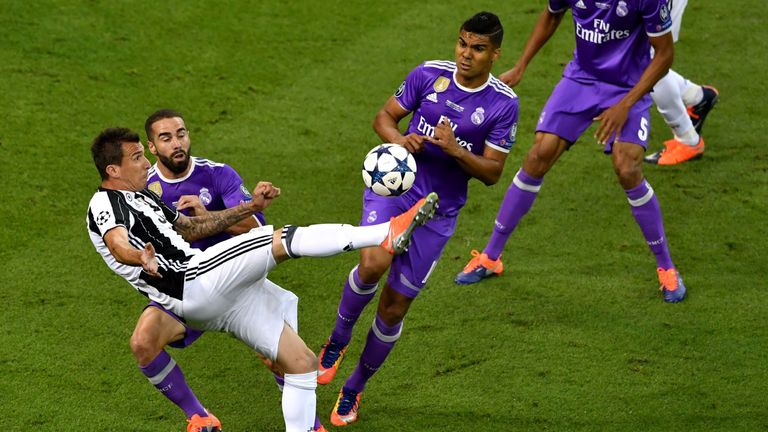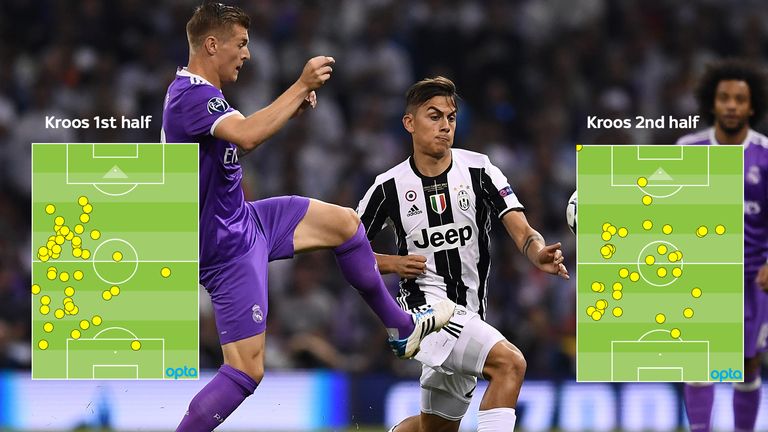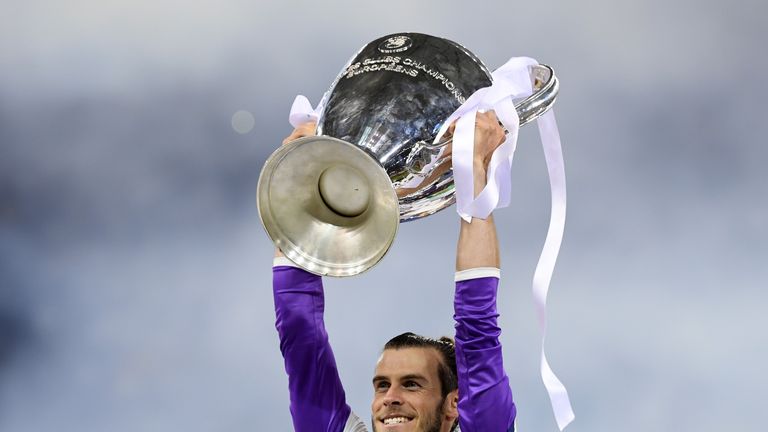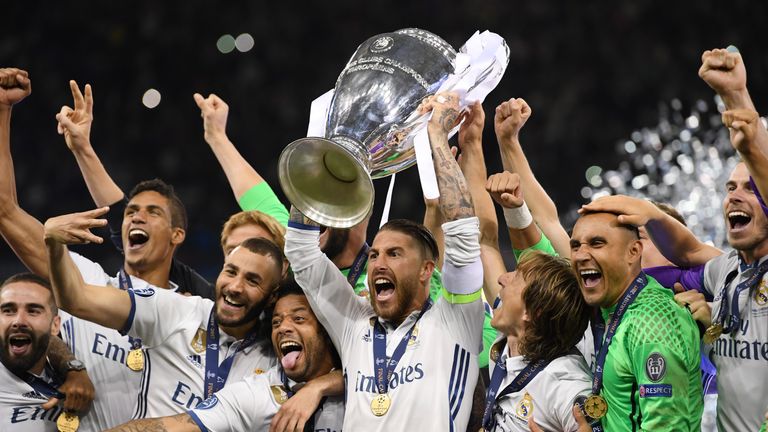How Real Madrid beat Juventus 4-1 to win Champions League
Sunday 4 June 2017 11:59, UK
Real Madrid became the first team to retain the Champions League with a 4-1 win over Juventus in Cardiff on Saturday night.
But how did Zinedine Zidane's men conquer the Italian champions who hadn't even conceded a goal from open play in the competition before the final?
Here we take a look at how Real Madrid pulled it off and the key talking points from the match…
Ronaldo takes centre stage
While much of the build-up to the Cardiff cup final centred on returning hometown hero Gareth Bale, it was Cristiano Ronaldo who starred at the Principality Stadium on Saturday night.
Trending
- World Darts Championship LIVE! Clayton wins thrilling last-leg decider
- Amorim questions decision-making from Rashford's camp
- Double blow! Sterling out 'for a while' - so will Arsenal sign a winger?
- Transfer Centre LIVE! Howe reluctant to sell Dubravka in January
- Usyk vs Fury 2: Fury 'robbed'? What do the stats reveal?
- World Darts Championship schedule: Cross headlines Monday's action
- Saka out for 'many weeks' with hamstring injury
- Liverpool latest: Van Dijk plays down quadruple talk
- Ref Watch: Pickford and Estupinan lucky to avoid unwanted Christmas cards?
- EFL latest: Sheff Utd takeover complete | Northampton appoint Nolan
The Portuguese found the net with his first shot of the game when Real Madrid were up against it and then converted from close range to all-but seal the tie on 64 minutes. He really is the man for the big occasion.
Among Ronaldo's many goal-scoring records in this competition, it is the fact he has scored twice as many quarter-final, semi-final and final goals in the Champions League as any other player which underlines his importance.
His hat-tricks in the previous rounds against Bayern Munich and Atletico Madrid were instrumental in Real's progress to the final and he was once again the Spanish club's go-to man against a Juventus team which has been superb defensively this season. "The players deserve it and so do I because I scored twice and I'm the top scorer in the Champions League," he said afterwards.
Mandzukic's magical moment
Mario Mandzukic may have ended up on the losing side but the Croatia international produced one of the greatest goals to grace a Champions League final with his first-half over-head kick, which capped a remarkable team move.
Leonardo Bonucci's long pass forward from just inside the Real Madrid half was expertly volleyed into the penalty area by Alex Sandro on the left flank, controlled and flicked up by Gonzalo Higuain and then chested and looped over Keylor Navas by Mandzukic.
It was an outrageous piece of skill which immediately drew comparisons with Zidane's own wondrous Champions League final volley against Bayer Leverkusen in 2002.
Real's key midfield change
Despite the final scoreline, it was Juventus who were the better team for much of the first half. The Italian champions started rapidly, testing Navas no less than three times within the first seven minutes, with Miralem Pjanic's drive from the edge of the box drawing a fine stop from the Real Madrid keeper. They didn't let up.
Ronaldo may have swept in an opener on the break but Juventus responded through Mandzukic's moment of magic and finished the half having taken more shots, attempted more crosses and won more duels.
"The first half was really tough, against a brilliant team in every aspect," Isco conceded after the game. Real Madrid were losing the midfield battle and needed to find a response. They did just that.
There was no personnel change from Zidane but with an inspirational half-time team talk - "he told us he really believed in us," said Cristiano Ronaldo - and by shifting Toni Kroos into a more central role the manager turned the tide.
The German playmaker, who had operated on the left in the first half, and his midfield partner, Luka Modric, dictated play after the break, while Casemiro - who made more tackles than any player on the pitch - continued to provide an effective screen in front of the Madrid defence.
The impact was emphatic. There may have been good fortune in the deflection for Casemiro's goal and the fourth came from Marco Asensio when the match was virtually over, but Juventus managed just one off-target shot in the second half and lost the key battles in the centre of the park while Real Madrid's tactical tweak gave them the platform to fire off 13 efforts, dominate possession and take control of the final.
Cuadrado's red card
Perhaps the only sour moment in an otherwise excellent final was the sending off of Juan Cuadrado with six minutes to play. The former Chelsea man was rightly booked for a cynical tackle from behind on Ronaldo but his second yellow card came after a needless - and ultimately ugly - moment with Sergio Ramos.
After the Real Madrid defender tangled with Cuadrado on the touchline, the Juventus player senselessly gave Ramos an unnecessary push and appeared to step on his foot. The reaction of the Real skipper was over the top but Cuadrado, 18 minutes after being subbed on, was sent off.
Bale's back
Bale hadn't featured for Real Madrid since El Clasico on 23 April but, after working hard to return from a calf problem in time for the Champions League final in Cardiff, the Welshman was rewarded with a late cameo by boss Zidane with 13 minutes to play.
The forward - whose introduction was greeted with loud cheers - almost pulled off a fairytale moment when he looked like latching onto Ronaldo's cross inside the six-yard box, but was denied by a block and spent the remainder of the match on the fringes of the action.
While he was unable to play the role in the final he would have wanted to, Bale can at least treasure a third Champions League winners' medal - and look ahead to entering pre-season fit and ready to build a base for an important 2017/18 campaign, in which he'll hope to remind people of what he can do when not hampered by injury as he has been for much of this campaign.
The Real Madrid era?
Real Madrid's La Liga triumph this season was their first since 2012, but on the European stage they have achieved a remarkable record of recent dominance of the Champions League.
The first team to retain the Champions League, Real Madrid have won three of the last four editions, while their latest victory was arguably their most impressive yet.
They've made at least the semi-finals every year since 2011 and have now extended their total haul of Champions Leagues and European Cups to 12 - five more than any other team. They reign over Europe right now.

